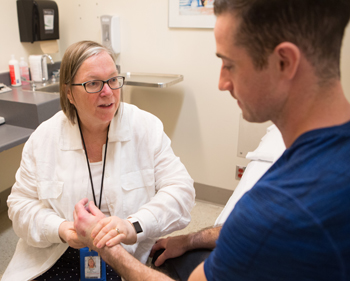New hand clinic provides care ‘at the right time from the right person’

By James Wysotski

Advanced practice occupational therapist Maureen Riley examines the hand of patient Glenn Forde. (Photo by Katie Cooper)
A new, streamlined referral process means less waiting for patients with hand injuries.
Since the creation of the Advanced Practice Occupational Therapy Hand Clinic in summer 2016, patients with issues such as simple fractures, joint injuries, tendonitis, arthritis or carpal tunnel syndrome can be referred directly to an occupational therapist instead of being sent first to plastic surgeon Dr. James Mahoney. As a result, wait times are usually one or two weeks instead of up to six.
Maureen Riley, an advanced practice occupational therapist, said it’s all about getting care for patients at the right time from the right person. She said there was too much of a delay with the old system, especially since Dr. Mahoney usually referred patients to an OT anyway. By the time she saw them, they were often stiff, with functional limitations, pain and swelling, which made treatment more difficult.
Instead, physicians from the Emergency Department can refer patients to Riley directly. A certified hand therapist, she assesses them and develops treatment plans that can include home-exercise programs to build strength and flexibility, splinting and ways to manage swelling. She also prescribes assistive devices to make life easier, such as special jar openers. During followup care, Riley also lets patients know when it is safe to resume life activities and sports. If needed, she refers them to the hospital’s Occupational Therapy Department for formal hand therapy. Any problems can have an expedited referral to Dr. Mahoney.
“The best treatments to get hands functioning as fast as possible are supervised education and exercise instruction.” – Dr. James Mahoney |
“I’m proud to be able to use my skills and knowledge in the clinic, and having a more autonomous role allows me to treat patients promptly and get them back to their daily lives faster,” said Riley.
If patients’ problems persist after completing all rehab options, they can be referred to Dr. Mahoney to determine next steps. He said it’s rarely necessary and that the new clinic benefits his practice by allowing him to focus more on his surgical cases.
“Having the new clinic frees me up to see another 10 patients a week who need a medical procedure,” said Dr. Mahoney. “It has increased the scope of my practice significantly.”
Riley fashioned the clinic, the only one of its kind in Toronto, after the Advanced Clinician Practitioner in Arthritis Care Program, which aimed to improve wait times by training experienced physical and occupational therapists and nurses. As demand for the clinic’s services increased, it changed from bi-weekly hours to weekly.
“Having this clinic has been tremendous because it allows me to see patients sooner and help prevent longer-term problems,” said Riley.
About St. Michael’s Hospital
St. Michael’s Hospital provides compassionate care to all who enter its doors. The hospital also provides outstanding medical education to future health care professionals in more than 29 academic disciplines. Critical care and trauma, heart disease, neurosurgery, diabetes, cancer care, care of the homeless and global health are among the Hospital’s recognized areas of expertise. Through the Keenan Research Centre and the Li Ka Shing International Healthcare Education Centre, which make up the Li Ka Shing Knowledge Institute, research and education at St. Michael’s Hospital are recognized and make an impact around the world. Founded in 1892, the hospital is fully affiliated with the University of Toronto.
